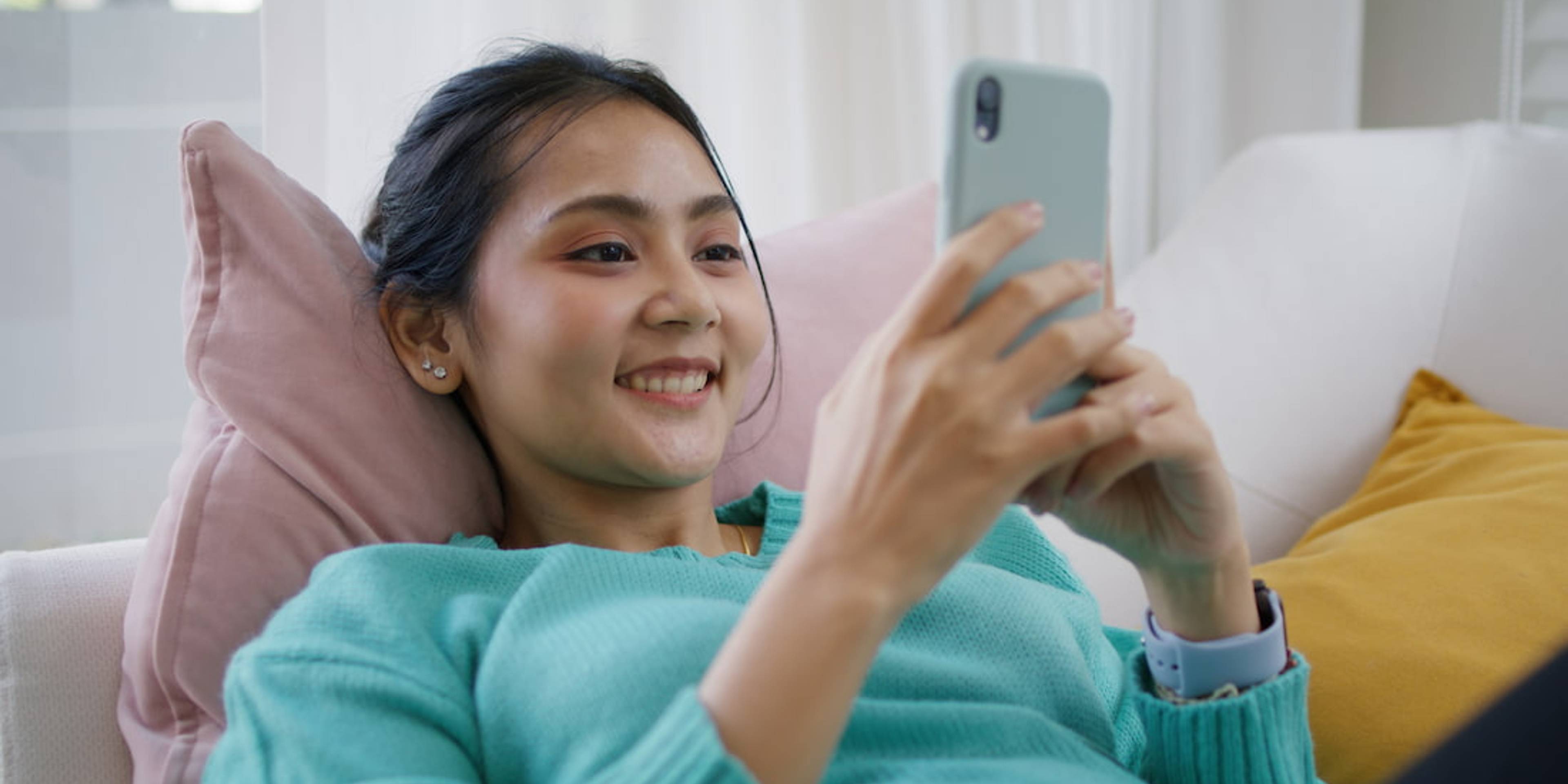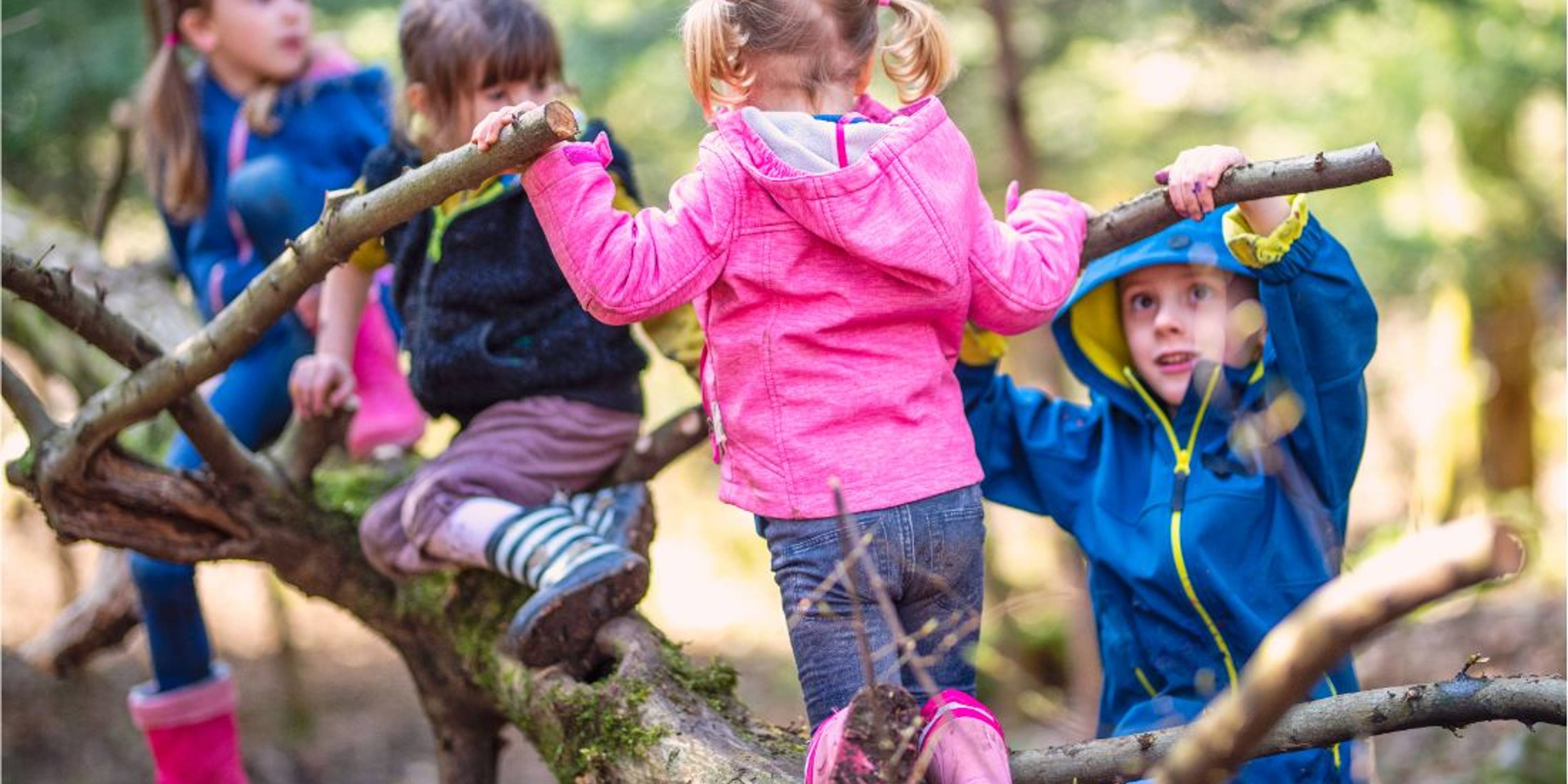October 17, 2024
How influential is social media on young people's mental health?

A significant body of evidence tells us that young people's mental health has decreased over time, and a potential link between social media use and this mental health decline has triggered wide interest and concern. Research into social media use and mental health is being conducted at a rapid pace but, so far, findings are far from conclusive. Our new Researcher of the Month, Dr Margarita Panayiotou, adds to this body of work. She led a team of researchers who recently published a study involving thousands of young people in the UK. It set out to explore the interplay between social media use and teens' mental health, wellbeing and social life, and found that when considering the complex combination of multiple factors, things such as a lack of family support are arguably more important for adolescent mental health than social media use.
Summary
The study uses data from the Understanding Society cohort, and explores the responses of 12,041 UK young people aged 10-15 from a nationally representative sample. The Understanding Society study follows thousands of young people and adults longitudinally, asking them to complete questionnaires every year. Adolescence is a complex developmental stage influenced by multiple interacting biological, social, and broader societal factors. These might include friendships, family relationships, teens' general environment, wider societal issues and school, as well as digital habits. Many existing studies focus on social media as an isolated issue. In contrast, Dr Panayiotou wanted to examine the impact of social media within the complex systems of adolescent mental health and development more generally. To do so, she and her team used a 'panel network analysis' to explore associations between social media use, mental health symptoms and social systems.
"Generally, our findings indicate that the time spent interacting with social media is among the least influential factors within adolescent mental health, functioning, and social life. In fact, life dissatisfaction and lack of family support were the most influential risk factors for females and males, respectively." (Dr Panayiotou, et al., 2023)
Dr Panayiotou and her team found that social media use was one of the least influential factors on mental health, functioning and wellbeing for this specific group of young people. They found that there were other factors, such as a lack of family support, concentration and restlessness problems, general life and family satisfaction which were all more influential on the participants’ mental health than social media.
This is not to say that there were no links. For females, reports of greater social media use, on average, were related to worse concentration and life satisfaction, whereas for males, these were associated with lower family support and higher levels of worry. Importantly, positive social media associations were also observed, but for females only, where higher use was related to less nervousness and greater friend satisfaction.
For females, greater levels of social media use predicted more concentration problems. This was not the case for males. However, interestingly, dissatisfaction with schoolwork and symptoms of restlessness were found to be more influential on concentration than social media (dissatisfaction with schoolwork having twice the effect of social media).
The network model allowed the researchers to see some interesting sequencing of events, or cascading effects. As an example, for males, being bullied could lead to social withdrawal. In turn, this predicted greater family dissatisfaction, which in turn predicted worse family support, finally predicting greater social media use and potentially influencing happiness levels. For males, unlike females, social media was not found to predict any indicators across time. In fact, for boys, the opposite was found to be true, in that greater social media use was predicted by a lack of family support. It is therefore possible that young males who do not have a good family support system may be more likely to resort to social media. On the other hand, in females, the study showed a sequential, cascading effect where dissatisfaction with appearance may potentially reduce general life satisfaction. In turn, this might impact on happiness levels, which might in turn influence levels of social withdrawal.
Implications
“Our findings suggest that the current depiction of social media use as the culprit of adolescent mental health difficulties is unwarranted and highlight the need for social policy initiatives that focus on the home and school environment to foster resilience.” (Dr Margarita Panayiotou et al, 2023)
In the conclusion to their paper, Dr Panayiotou and team note that in terms of targeting risk and protective factors in the complex systems underpinning the development of adolescent mental health, the findings suggest that intervention efforts focusing on key aspects of young people’s social lives and their experience of school might be more beneficial than simply attempting to regulate their time spent on social media. So what can parents and teachers do?
Speak with young people openly to identify their specific needs.
Take an interest in their digital lives and take on board what they say that they need, rather than making assumptions. Consider what key challenges they face to enable a focus on tailored guidance. Aim to identify the positives and manage the negatives.
Make use of existing resources.
Organisations such as Childnet, Internet Matters and our own Tooled Up platform all offer excellent, specific, evidence-based guidance on social media issues, which go beyond safety to consider other issues such as appearance or fear of missing out.
Be curious.
Talk to young people about their use of social media. Ask them what they like about the platforms that they're using. Where do they engage that makes them feel good? What have they learned? Asking curious questions can help to establish what aspects of their use are beneficial and can help to nudge them away from anything that doesn’t make them feel good.
Acknowledge the challenges that they face.
Some challenges associated with social media appear again and again in research. One of the main pressures that we know about is appearance, comparison and body ideals. Other important issues to consider include the pressure of staying online and following digital etiquette, fear of missing out, the exposure to risky content, and the potentially overwhelming exposure to information. In conversations with young people, acknowledge that if they do struggle online, this is very normal and is something that young people commonly report.
Put things into context.
Remember that whilst some experiences are unique to social media (such as the constant exposure to so much information), others have recurred in different contexts over time. Challenges with appearance comparison and body ideals were, in the past, explored on TV or in magazines or newspapers. Now they are online. We can learn from the past here.
Model and develop healthy habits, including phone-free time.
Navigate a balanced approach to life together. This should involve time away from phones and real life socialising, spending time with family where possible and doing other things that you and they find enjoyable, alongside digital experiences. It is important to bear in mind that this will vary depending on a young person's circumstances. Notice and reflect on your own habits too.
Bring young people into conversations around rule setting.
If, as a school or parent, you are considering implementing digital use guidance, or perhaps you are thinking about joint rules across a year or friendship group, make sure that you involve children in their design and try to reach some common agreement around rules that will work. If young people are consulted, and feel involved and invested in guidelines, they are much more likely to follow them.
Be sceptical of simplistic answers to complex questions.
In Jonathan Haidt’s bestselling book, The Anxious Generation, he argued that smartphones caused a mental health crisis in adolescents through social deprivation, sleep deprivation, attention fragmentation, and addiction. He calls it the “great rewiring of childhood” and “the single largest reason for the tidal wave of adolescent mental illness that began in the early 2010s”. Dr Panayiotou believes this to be an overstatement and oversimplification of a very complex issue, especially given what we know about the complexity of adolescent development and mental health. How can one thing be the sole reason behind mental health decline given all these interacting factors? When we do acknowledge complexity, as in Dr Panayiotou’s recent paper, a different picture can emerge, one which stresses the importance of considering our children's lives in the round, not only focusing on one single issue.
Listen to our podcast interview with Dr Panayiotou here.

Dr Margarita Panayiotou
Senior Lecturer in Educational Psychology at the University of Manchester
Dr Margarita Panayiotou is a senior Lecturer in Educational Psychology at the University of Manchester. She is interested in understanding and improving adolescent mental health. Dr Panayiotou is currently leading a project that focuses on better understanding and assessing adolescent social media experience.
Dr Margarita Panayiotou
Senior Lecturer in Educational Psychology at the University of Manchester
Scroll our research gallery

Jan 19, 2026
The power of reading: books, vocabulary and learning
Did you know that 2026 is the UK’s National Year of Reading? This long-overdue initiative reflects growing concern and renewed commitment around children’s reading and literacy. As Dr Maria Korochkina, our latest Researcher of the Month, puts it: “The ability to read opens up worlds. Reading enables children to progress into post-primary education and provides the basis for lifelong learning and prosperity into adulthood”. Frequent readers tend to have a stronger understanding of both their own and others’ emotions. They are often better able to communicate these emotions, a skill linked to higher emotional intelligence and improved mental wellbeing. Reading also encourages cause-and-effect reasoning and helps children imagine scenarios beyond the immediate moment - developing the skill of -future-thinking'. A rich vocabulary underpins learning across the school curriculum, strengthens thinking and communication skills, and predicts both academic attainment and later life outcomes. Research consistently shows that the most effective way to build vocabulary is through reading. However, learning to read well is not quick or effortless. The journey to skilled reading typically spans around ten years, requiring high-quality classroom instruction alongside sustained practice through independent reading. For many children, this process is painstaking, demanding consistent teaching, encouragement and opportunity over time. Against this backdrop, recent evidence presents a worrying picture. Fewer children are reading for pleasure than ever before. In 2024, only one in three UK children and young people aged eight to 18 reported enjoying reading in their free time. Even more strikingly, just one in five said they read daily for pleasure, the lowest level recorded since the National Literacy Trust began collecting this data in 2005. This matters because reading ability and reading enjoyment are deeply intertwined. Children who find reading effortful are far less likely to choose to read independently. Dr Korochkina’s research highlights how early reading experiences shape later habits: difficulties with phonic and morphological knowledge in the early stages of reading acquisition can have a snowball effect, reducing confidence, fluency and motivation over time. Her work also offers a powerful note of optimism. Books that children actively choose to read, including contemporary, popular texts, provide rich opportunities to develop vocabulary, particularly when children read widely. Ensuring access to a diverse range of engaging reading material, alongside strong early instruction, can play a vital role in building both reading skill and reading motivation. Fostering confident, motivated readers requires long-term commitment. It is not enough for children simply to have books available to them. They need skilled teaching, time, practice and a culture that values reading as both a skill and a pleasure.

Dec 15, 2025
Crossing the line into cybercrime
As the most digitally connected generation so far, young people today face new challenges. Our latest Researchers of the Month, Professor Davidson and Dr Farr, have found that in the last decade, an increasing number of young people (particularly young men) have committed serious cybercrime offences, particularly hacking and money laundering. Their new book, written following a large research project funded by the European Union’s Horizon 2020 research and innovation programme, seeks to understand the drivers behind this trend. It explores a range of potential factors that may lead young people to engage in risky online behaviours, and to identify effective pathways for prevention.

Nov 16, 2025
Supporting Children’s Use of AI
Children and young people are now growing up surrounded by AI, and the landscape is shifting fast. In the UK, recent data from Ofcom and Internet Matters suggests that around half of children aged 8–17 regularly use generative AI tools such as ChatGPT, Bard or Snapchat’s MyAI. Many describe these interactions as feeling like conversations with a friend. A recent report from Common Sense Media found that 33% of teens had actually chosen to talk to an AI companion instead of a real person about something important or serious. Whether children are asking voice assistants to answer their questions, relying on chatbots for bedtime stories, using learning apps for revision or engaging with large generative AI models, it’s essential to remember that most of these systems were built with adults in mind, not children. They often assume levels of attention, memory and emotional maturity that younger users simply don’t have. Even older children and teenagers, who increasingly use AI as a supportive confidante (often without adult supervision or knowledge), are still learning to navigate boundaries around trust, identity and emotion. Our latest Researcher of the Month, Dr Nomisha Kurian, wants this to change. She has developed a new framework called Developmentally Aligned Design (DAD), which outlines how AI can be built with children’s needs, vulnerabilities and strengths at its core. She also chatted to us at Tooled Up, sharing practical tips on recognising when children may be relying too heavily on AI for emotional connection, how to talk to them about healthy boundaries, and how parents and educators can help children and young people use AI tools safely, creatively and critically.

Oct 16, 2025
Algorithmised Girlhood: Teenage Girls and TikTok
As part of the early stages of her PhD study, our latest researcher of the month, Chiara Fehr, ran several focus groups about experiences of TikTok with eight 17 year old girls. Using creative methods, such as ‘TikTok show and tells’ a collaging session and a utopic mapping exercise, Chiara is exploring whether dominant narratives around growing up in a digitised world reflect the real life experiences of teens, and has summarised her findings so far in a recent article.
![“[They use devices] alllllllll day long”. What do children think about our tech use?](https://cdn.sanity.io/images/jxfh43in/content-prod-d2c/79f219275088655f59590f61ff29b6bc8b0d77f8-1100x733.jpg?w=3840&h=1920&q=70&fit=crop&crop=center&auto=format)
Sep 09, 2025
“[They use devices] alllllllll day long”. What do children think about our tech use?
We're all used to reading about children and young people's increasing use of digital tech. But what about adults' use? And what impact might our tech use have on family life? Parents today are spending an unprecedented amount of time on their devices. One study found that parents spend an average of nine hours per day engaged with screen devices. Over four hours of this is on smartphones, averaging 67 phone checks per day. Despite children's central role in family life, their voices and perspectives on the device use of the adults around them have been largely neglected in research. Along with colleagues, our latest Researcher of the Month, Professor Cara Swit, has published a fascinating study exploring the experiences and perceptions of children aged six to nine about their parents’ device use at home and its impact on them.

Aug 13, 2025
Students’ views on smartphone bans
In recent years, banning or restricting children’s access to smartphones and social media has grasped the attention of policy makers, schools and parents. A number of countries, including France, Turkey, Norway, Sweden, and regions of the US and Canada have introduced laws, policies or guidance for schools to ‘ban’ or heavily restrict the use of phones. Within Ireland, in 2024, the Minister for Education announced her intention to introduce smartphone bans in post-primary schools, whilst at the same time acknowledging that individual schools are best placed to decide on the scope and scale of restrictions for their students. Whilst these bans aim to protect children from harm, and teachers often anecdotally report seeing benefits, evaluations of existing research highlight a lack of evidence on their efficacy. At the moment, we simply don't know enough about the impact of bans. Evidence is hampered by the fact that technological developments and technology use is moving at a faster pace than research. Some studies suggest that bans are beneficial to academic outcomes and mental wellbeing. Others suggest no effects. However, many studies have methodological weaknesses, use small samples or retrospective data, and can't ascribe causal mechanisms. Our latest Researcher of the Month, Dr Megan Reynolds, has recently published a paper which explores young people's perspectives and experiences of smartphone bans in their schools. Unlike most previous research, it centres student voices in this high profile issue.

Jul 14, 2025
Do teens with mental health conditions use social media differently than their peers?
As Luisa Fassi, our new Researcher of the Month, comments, "The link between social media use and youth mental health is hotly debated, but hardly any studies look at young people already struggling with clinical-level mental health symptoms". In fact, Luisa's large systematic review and meta-analysis found that only 11% of papers published on the topic since 2007 focused on young people with clinical conditions. Her review also showed that the data used to evidence mental health conditions in these existing studies is not always strong or especially robust. Many report links between social media and mental health on the basis of short self-report questionnaires, where young people are asked about symptoms. Whilst this wasn't found as part of Luisa's review, it is also the case that very few papers in the field differentiate between different mental health conditions, or examine different symptoms or conditions (such as anxiety, ADHD or eating disorders) in isolation. To address this research gap, Luisa and colleagues have recently published a fascinating and nuanced paper. It analyses both quantitative and qualitative dimensions of social media use from a nationally representative survey of 3,340 teens in the UK aged between 11 and 19 years old, which was conducted by NHS Digital in 2017. Rather than gathering mental health data from self-report questionnaires, the young people in the survey underwent a full clinical screening, which included interviews with the young people, their parents and teachers. Information about social media use came from questionnaires completed by participants. They were not asked about specific platforms. Luisa used this data to gather novel insights into how social media and mental health are related in teens who both meet and do not meet diagnostic criteria for a wide range of mental health conditions. The study does not establish any causal links, but it does reveals a range of differences between young people with and without mental health conditions when it comes to social media.

Jun 17, 2025
Navigating the feed: younger adolescents' reflections on algorithmically curated social media
Our latest researcher of the month, Roxana Pomplun, has investigated the interactions, experiences and perceptions of younger adolescents, aged 11, 12, and 13, with algorithmically curated platforms such as TikTok, YouTube Shorts, Spotlight on Snapchat and Reels on Instagram. These kinds of platforms use algorithms to personalise and tailor feeds, harnessing user data to suggest content that the individual is most likely to be interested in and engage with. As such, young people have little control over what they are seeing in their feeds. Tech companies are not yet required to be transparent about the data that they are collecting, but it tends to include demographic information such as age, gender or location, along with use patterns. Whilst these sites dominate the digital lives of tweens and teens, until now they have received little dedicated research attention, particularly in relation to younger users, with most existing studies focusing on older teens. Whilst we know that most social media platforms have age limits of 13, we also know that many younger children are active users, particularly of algorithmically curated platforms like TikTok and YouTube Shorts. Given that early adolescence is a life phase marked by critical neurological development, identity development and heightened susceptibility to mental health issues, deepening our understanding of how younger adolescents engage with social media is vital. Roxana's qualitative research, where a group of young people eloquently explore their own experiences and perceptions, broadens our knowledge of social media use within an age group that appears increasingly aware of the digital influences shaping their online experiences, yet which is still in need of support to fully navigate these ecosystems.

May 15, 2025
Looking beyond smartphone bans
Over the last year or so, there has been a surge in public concern around smartphones and social media. Banning or restricting children’s access to smartphones and social media has grasped the attention of policy makers, schools and parents. A number of countries, including France, Turkey, Norway, Sweden, and regions of the US and Canada have introduced laws, policies or guidance for schools to ‘ban’ or heavily restrict the use of phones. In the UK, there are proposals to raise the age of ‘internet adulthood’ from 13 to 16, and to ban smartphones in schools. The third reading of a private members’ bill on this topic will be heard in parliament in July. Whilst these bans aim to protect children from harm, recent studies highlight a lack of evidence on their efficacy. Along with a team of international experts, our latest Researcher of the Month, Professor Victoria Goodyear, argues that, in isolation, banning smartphone and social media access fails to equip children for healthy use of technology. She suggests that there is a need to shift debates, policies and practices away from a sole focus on restricting smartphone and social media access, toward an emphasis on nurturing children’s digital skills for healthy technology use, and a rights-respecting approach which is underpinned by age-appropriate design and education.

Apr 22, 2025
Encouraging adventurous play in the preschool years
Tune into our podcast interview with April's researchers of the month here. As well as providing numerous opportunities for exploration, joy, and expression, outdoor and adventurous play - the type of play that allows children to take age-appropriate risks - is associated with a range of positive health behaviours and outcomes. Yes, we're talking about the kind of play that might leave us adults with our hearts in our mouths at times, as children start to disappear up a tree, or engage in a rough and tumble game of chase. But its benefits are wide-ranging and known impacts include increased levels of habitual physical activity alongside better mental health and positive mood. In 2019, Dr Hesketh was involved in the creation of physical activity guidelines in the UK, which explicitly note the importance of outdoor play for children in the preschool age group. We know quite a lot about the play habits of school-aged children, but until now, have had significantly less data on their younger counterparts. Our Researchers of the Month, Dr Kathryn Hesketh and Professor Helen Dodd set out to discover how much time preschool-aged children spend playing in a range of indoor and outdoor spaces, and how adventurously they are playing within them. In the first national survey of play in children of this age, they asked over 1000 parents of two to four year olds about their children’s play habits, finding that, on average, children aged two to four spend around four hours per day (outside of educational settings) playing. Just under 50% of this was spent playing outdoors. Their findings shed interesting light on some inequalities in play, even in the youngest age group, which may exacerbate existing inequalities in health.


